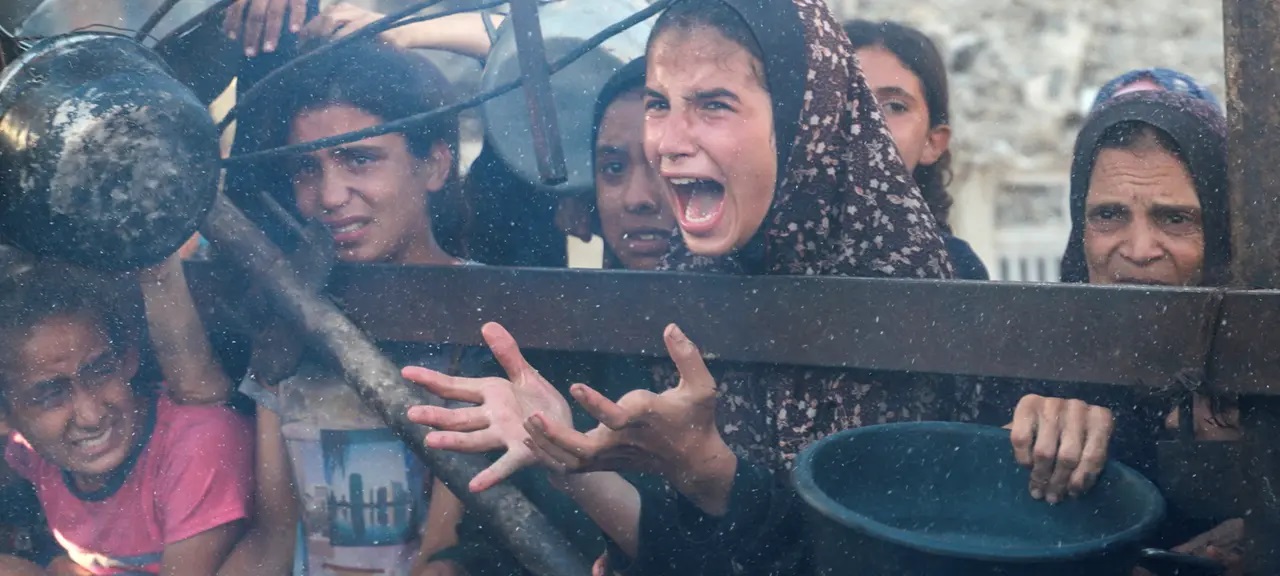Doctors Without Borders warns of a severe increase in malnutrition in the Gaza Strip, with over 800 individuals reportedly killed while seeking assistance. The organization highlights the role of Israeli restrictions on food imports as a contributing factor to the humanitarian crisis. Calls for urgent access to humanitarian aid are intensifying as the situation deteriorates.
Rising Malnutrition Crisis in Gaza: Nearly 800 Lives Lost in Search for Food


Warning of Increasing Hunger in Gaza
The aid organization Doctors Without Borders warns of a significant rise in malnutrition in the Gaza Strip. At the same time, finding food has become a dangerous endeavor for the people. According to the UN, nearly 800 individuals have died recently near distribution centers.
The population in the heavily contested Gaza Strip is increasingly suffering from hunger, according to Doctors Without Borders. Their local teams have reported "a significant increase in cases of acute malnutrition" in the besieged coastal territory.
"This is the first time we have observed such a severe level of malnutrition in Gaza," quoted the statement Mohammed Abu Mughaisib, the deputy medical coordinator for Doctors Without Borders in Gaza. "The hunger of the people in Gaza is intentional; it could end tomorrow if the Israeli authorities allow the large-scale import of food."
In their two health centers in Gaza City and the coastal town of Al-Mawasi, more than 700 pregnant and breastfeeding women and nearly 500 children with severe and moderate malnutrition are currently receiving outpatient treatment. The figures in Gaza City have reportedly quadrupled in less than two months, from 293 cases in May to 983 cases in early July. Out of these, 326 cases involve children aged between 6 and 23 months.
Criticism of Israel
The malnutrition in the Gaza Strip is a result of deliberate decisions made by the Israeli authorities, according to the statement. Israel restricts the import of food to a life-sustaining minimum and militarizes the subsequent distribution. Therefore, Doctors Without Borders urgently demands unrestricted access for humanitarian aid, including food and medicines, and the protection of the civilian population.
Israel controls all access points to the Gaza Strip, thereby managing transportation routes for any humanitarian aid. In March, it blocked all aid deliveries and only slightly eased the blockade at the end of May. Israel justifies the reduction of aid shipments by claiming that the Hamas terrorist organization would steal the goods. However, UN organizations report that there is no evidence to support this claim.
Finding food is becoming increasingly dangerous for the people in the Gaza Strip. Since the end of May, nearly 800 individuals seeking assistance have been killed near distribution centers, according to United Nations reports. Between May 26 and July 7, 615 individuals were killed near distribution points of the controversial private organization Gaza Humanitarian Foundation (GHF), stated Ravina Shamdasani, spokeswoman for the UN Human Rights Commissioner Volker Türk. Another 183 people were likely killed "along the routes of the UN and other humanitarian aid convoys," Shamdasani added.
UN: Most Deaths Due to Gunshot Wounds
In total, almost 800 people have been killed "while attempting to access assistance," said Shamdasani. Most of the injuries have been gunshot wounds. Shamdasani emphasized that the UN Human Rights Office has repeatedly expressed "serious concerns regarding compliance with the principles of international humanitarian law" in the Gaza conflict. It is "unacceptable" that individuals are attacked where they line up for vital goods such as food and medicine.
The Israeli army attributed the shootings of civilians in the vicinity of distribution centers to Hamas. In response to the UN report, the army stated it had learned lessons from the deadly incidents. The incidents near the distribution points will be investigated. There have also been efforts to reorganize the area by erecting fences and signs, opening additional pathways, and implementing other measures, the Israeli army stated.
The GHF, supported by Israel and the US, announced yesterday that it has distributed over 69 million meals to date. The foundation denied allegations of fatal shootings in the immediate vicinity of its distribution centers.
After the lifting of the Israeli blockade, the GHF resumed its work and opened four distribution centers in the southern and central parts of the Palestinian territories. The UN and large aid organizations have refused to cooperate with the foundation, accusing it of adhering to the plans of the Israeli army and thereby violating fundamental humanitarian principles. Several aid organizations, including Doctors Without Borders and Save the Children, recently called for the GHF to cease its operations and for the distribution of aid to be coordinated again by the UN.

 বাংলা
বাংলা  Spanish
Spanish  Arabic
Arabic  French
French  Chinese
Chinese 



